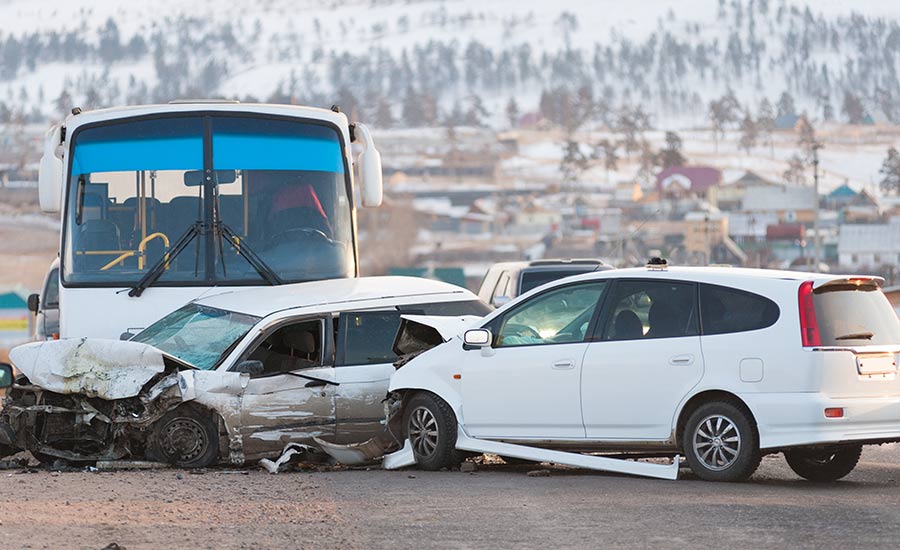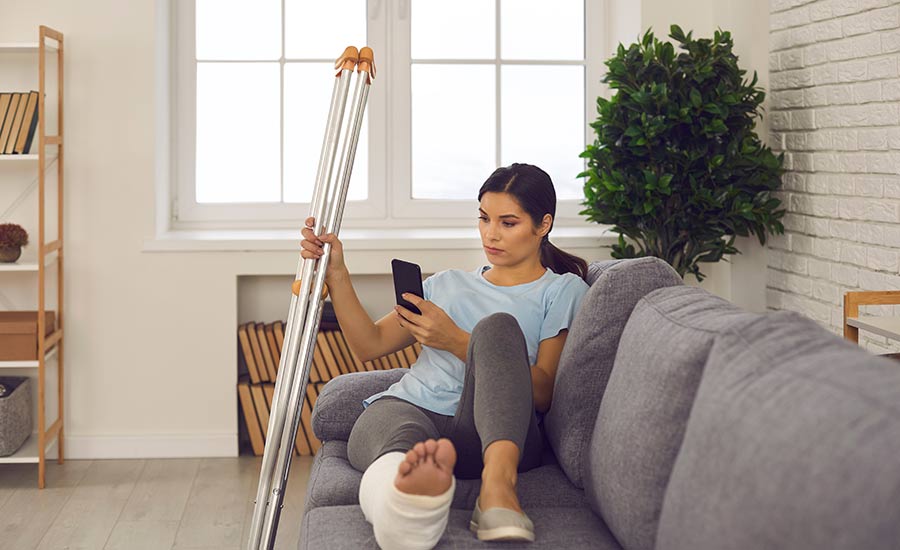

Whether you sustained injuries in a bus accident as a pedestrian, driver or passenger, understanding the do’s and don’ts in the aftermath is an important part of protecting your legal interests.
Join us as we shed light on the steps to take after a bus accident, what to avoid and what type of compensation you can seek if you were injured.
Steps To Take After A Bus Accident
From prioritizing safety to keeping all documentation for a potential personal injury claim, follow the steps below if you were involved in a bus accident.
1. Prioritize Safety
If you were on the bus when the accident occurred, leave the vehicle and move to a safe location away from traffic to avoid subsequent accidents and injuries.
If you were involved in the accident as a driver, turn on your hazard lights to warn other drivers, get out of the vehicle and move to a safe location.
2. Call Emergency Services
Call 911 to report the accident. Make sure you mention that the accident involved a bus, and let the dispatch team know whether the accident is blocking traffic.
3. Seek Medical Attention
Request medical assistance for your injuries. The substantial size and weight of buses often result in severe injuries that may be life-threatening.
Even if your injuries seem minor, seeking medical attention is important, as some injuries may not manifest immediately (If you were driving, find out what symptoms to watch out for after a car accident).
A medical evaluation is also important to document your injuries for insurance and legal purposes.
4. Document The Scene
Take photos of the accident scene, including:
- Vehicle positions
- Vehicle damages
- Street signs
- Road conditions
- Weather and lighting conditions
5. Exchange Information
Exchange contact, insurance and registration information with the bus driver and other parties involved in the accident.
Collect:
- Names
- Addresses
- Phone numbers
- Insurance details
- Bus company information
6. File A Police Report
File a police report and request a copy or obtain the report number for future reference. Read more about when and how you can amend a police report in our extensive guide.
7. Notify Your Insurance Company
Inform your insurance company about the accident as soon as possible, but be careful not to admit any fault.
Failure to report the accident within the required reporting timelines could jeopardize your eligibility for coverage and compensation.
8. Schedule A Consultation With An Experienced Attorney
Consult an attorney who is experienced in personal injury. A personal injury lawyer will explain your legal options and provide guidance on your next steps.
Keep Evidence
Keep track of all documents related to the accident and your injuries, including:
- Medical records
- Repair estimates
- Communication with insurance companies
This documentation can be crucial in the claims process where experts will evaluate the worth of your case.

What Not To Do After A Bus Accident
Now that you know what to do after a bus accident, it is equally important to be aware of the actions to avoid.
Do Not Leave the Scene
If you were involved in the accident as a driver, leaving the accident scene could result in legal consequences. You are legally obligated to stay and exchange information with other parties.
Do Not Admit Fault
Avoid apologizing or admitting fault. Fault determination is a complex process and your statements at the scene can be used against you in legal proceedings.
Do Not Discuss The Accident On Social Media
Refrain from sharing information about the bus accident on social media. Posting accident details may compromise your legal position and the statements you made online can be used against you later.
Do Not Agree To Immediate Settlements
Do not accept immediate settlement offers from insurance companies without prior consultation with an experienced bus accident lawyer.
Insurance adjusters may try to minimize your claim, and the compensation may not cover your total expenses after the accident — especially if your injuries manifest at a later stage.

Who Is Liable For A Bus Accident?
The parties that can be held liable after a bus accident include:
- The bus driver: The bus driver may be held liable if he or she showed negligence, such as distracted driving or a traffic rule violation. For example, if a bus driver runs a red light and causes a collision, the driver could be held responsible.
- The bus company: The bus company may be held liable for the accident if they failed to conduct required maintenance, demonstrated negligent hiring practices or failed to make sure that the driver followed safety regulations.
- Other motorists: Drivers of other vehicles may be held liable if their actions, such as failure to yield or reckless driving, contributed to the collision. For instance, a driver who rear-ends a bus due to distracted driving may be at fault for the accident.
- The bus manufacturer: The bus manufacturing company may be held liable if the bus accident resulted from a defect in the bus. For example, if the collision was caused by a brake failure due to manufacturing defects, the bus manufacturer may be at fault. In this scenario, you might have the right to file a product liability claim.
- Government entities: Government agencies may be held responsible if the bus accident was caused by poor road conditions, inadequate signage or faulty traffic signals. In this case, the responsible government agency may be held liable for negligence in maintaining safe roadways. Find out when you can sue the city for unsafe roads in our detailed guide.
Determining liability in a bus accident requires a thorough investigation to identify the party responsible for the incident.
The factors that can help establish liability typically include driver actions, vehicle maintenance and external conditions that might have contributed to the accident.
To make sure your interests are protected, partner with a trusted personal injury law firm like Spar & Bernstein.
With 50+ years of experience and hundreds of success stories, our tenacious attorneys will fight on your behalf for fair compensation, every step of the way.
What Damages Can You Claim After A Bus Accident?
From medical expenses to compensation for pain and suffering, there are several different types of compensation you can claim after a bus accident.
Damages may include:
- Medical expenses: You can claim compensation for current and future medical costs related to the injuries you sustained, including surgeries, hospital bills, ongoing medical care and rehabilitation.
- Lost wages: You can claim compensation for lost wages if the injuries you suffered caused you to miss workdays and work benefits.
- Pain and suffering: You can claim compensation for pain and suffering if your bus accident injuries caused you to experience physical pain, emotional distress or deterioration in your quality of life.
- Wrongful death: You can claim compensation for wrongful death if the bus accident brought about a fatal outcome for your loved one. Wrongful death compensation can cover funeral expenses, loss of financial support and emotional suffering.
- Loss of consortium: You can claim compensation for loss of consortium if the injuries you sustained had a negative impact on your relationship or led to loss of companionship and intimacy.
- Disability and disfigurement: You can claim compensation for disability and disfigurement if your injuries affected your ability to perform daily activities or engage in gainful employment. For example, if the accident led to the loss of a limb or severe paralysis, you can claim disability and disfigurement.
Were You Injured In A Bus Accident? Contact Spar & Bernstein
If you suffered injuries in a bus accident, our dedicated personal injury team at The Law Offices of Spar & Bernstein will provide personalized and compassionate legal guidance, while fighting for the compensation you deserve.
We will help you navigate the intricacies of insurance claims and lawsuits, talk to witnesses and experts, assess liability, complete and file documents and represent you to find a successful outcome in your case.
FAQs About Bus Accidents
Have more questions about bus accidents? Check out the commonly asked questions below.
What are the most common causes of bus accidents?
The most common causes of bus accidents include:
- Driver fatigue
- Distracted driving
- Poor road conditions
- Vehicle defects
- Inclement weather
Are there bus safety regulations in New York?
Yes, there are strict regulations imposed by the Department of Transportation in New York. These regulations are meant to ensure bus safety across the state. They cover:
- Maintenance standards
- Driver qualifications
- Operational guideline by relevant transportation authorities
How can I reduce the risk of injuries while traveling on a bus?
To reduce the risk of injuries while traveling by bus:
- Use a seatbelt
- Use handrails — especially during stops, starts or turns
- Follow safety instructions from the bus driver
- Avoid standing or moving around the bus while it is moving
- Remain alert to changes in traffic
- Refrain from engaging in activities that may distract the driver or compromise your own safety, such as loud conversations
How can drivers, pedestrians and cyclists avoid bus accidents?
To avoid bus accidents, pedestrians and cyclists should:
- Be cautious around buses
- Avoid blind spots
- Obey traffic signals
What should I do if I witnessed a bus accident?
If you were a witness to a bus accident, report it to the authorities, provide a detailed account of the incident and offer assistance to those who are injured.





